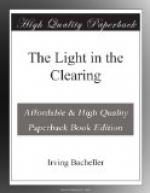We unhitched and went in to supper. I was hoping that Aunt Deel would speak of my work but she seemed not to think of it.
“Had a grand day!” said Uncle Peabody, as he sat down at the table and began to tell what Mr. Wright and Mr. Dunkelberg had said to him.
I, too, had had a grand day and probably my elation was greater than his. I tarried at the looking-glass hoping that Aunt Deel would give me a chance modestly to show my uncle what I had done. But the talk about interest and mortgages continued. I went to my uncle and tried to whisper in his ear a hint that he had better go and look into the wood-shed. He stopped me before I had begun by saying:
“Don’t bother me now, Bub. I’ll git that candy for ye the next time I go to the village.”
Candy! I was thinking of no such trivial matter as candy. He couldn’t know how the idea shocked me in the exalted state of mind into which I had risen. He didn’t know then of the spiritual change in me and how generous and great I was feeling and how sublime and beautiful was the new way in which I had set my feet.
I went out on the porch and stood looking down with a sad countenance. Aunt Deel followed me.
“W’y, Bart!” she exclaimed, “you’re too tired to eat—ayes! Be ye sick?”
I shook my head.
“Peabody,” she called, “this boy has worked like a beaver every minute since you left—ayes he has! I never see anything to beat it—never! I want you to come right out into the wood-shed an’ see what he’s done—this minute—ayes!”
I followed them into the shed.
“W’y of all things!” my uncle exclaimed. “He’s worked like a nailer, ain’t he?”
There were tears in his eyes when he took my hand in his rough palm and squeezed it and said:
“Sometimes I wish ye was little ag’in so I could take ye up in my arms an’ kiss ye just as I used to. Horace Dunkelberg says that you’re the best-lookin’ boy he ever see.”
“Stop!” Aunt Deel exclaimed with a playful tap on his shoulder. “W’y! ye mustn’t go on like that.”
“I’m tellin’ just what he said,” my uncle answered.
“I guess he only meant that Bart looked clean an’ decent—that’s all—ayes! He didn’t mean that Bart was purty. Land sakes!—no.”
I observed the note of warning in the look she gave my uncle.
“No, I suppose not,” he answered, as he turned away with a smile and brushed one of his eyes with a rough finger.
I repeated the rules I had learned as we went to the table.
“I’m goin’ to be like Silas Wright if I can,” I added.
“That’s the idee!” said Uncle Peabody. “You keep on as you’ve started an’ everybody’ll milk into your pail.”
I kept on—not with the vigor of that first day with its new inspiration—but with growing strength and effectiveness. Nights and mornings and Saturdays I worked with a will and my book in my pocket or at the side of the field and was, I know, a help of some value on the farm. My scholarship improved rapidly and that year I went about as far as I could hope to go in the little school at Leonard’s Corners.




